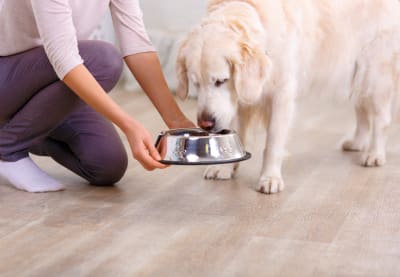For a dog who has diabetes, one of the most important elements in keeping him healthy is a consistent diet. In this post, our Huntersville vets define dog diabetes and how to plan a diet for a dog with diabetes.
What is Dog Diabetes?
Canine diabetes (dog diabetes) is an incurable disease caused either by a lack of insulin (a hormone that maintains blood sugar levels) in your dog’s body, or an insufficient biological response to it. When a dog eats, typically insulin carries the glucose in their food to their cells. However, if your dog’s body can’t properly use insulin or produce enough of it, his body won’t be able to use the glucose appropriately.
What are the symptoms of dog diabetes?
The resulting increase in your dog’s blood sugar levels can have negative side effects. Diabetes symptoms include:
- Unexplained weight loss
- Lack of energy
- Changes in appetite
- Breath that smells “sweet”
- Increase in urination
At LakeCross Veterinary Hospital, we identify diseases by running diagnostic tests when we perform exams. Based on the test results, we can create treatment plans.
What is the best diet for a dog with diabetes?
After you receive a diagnosis of diabetes, your next question to your vet will be about what to feed your canine friend now that you’re concerned about managing this disease. Diet management is one of the most critical parts of treating diabetes in dogs (along with providing regular insulin injections) - a responsibility that weighs heavy on the minds of many owners.
Though diet management for diabetic dogs is a topic researchers continue to explore, most vets (including us) will recommend a high-fiber, low-fat diet. While fiber helps your dog feel full and slows the entrance of glucose into the bloodstream, you’ll find fewer calories in low-fat foods. This helps with weight management.
We recommend owners focus more on the consistency of your diabetic dog’s diet than the actual food. Ask your veterinarian for recommendations for high-quality food that skips simple sugars, which will send your dog’s blood sugar levels soaring.
You should also ban all table scraps or treats that contain foods high in glycemic (another ingredient which sends blood sugar levels too high), including munchies heavy with sugars such as corn syrup, sweeteners and bread.
Tips for a Healthy Diet for a Dog with Diabetes
- Consistency is critical. Feed your dog at the same time each day, and give him the same type of food at the same time, and in the same quantity. Consult your veterinarian first about any changes you’re considering making to your dog’s diet.
- Staying lean is key. If your dog is found to be overweight, losing a few pounds could help his cells use insulin more efficiently.
- Make sure your canine companion drinks plenty of water to counteract the fiber in his new diet, as fiber takes water from the body. An unbalanced amount of fiber and water can lead to constipation and other issues.
- Has your dog lost his appetite? Notify your veterinarian right away - this could mean he’s experiencing other diabetes-related complications - or just that he doesn’t like the food.
- Don’t provide insulin injections to your dog when he’s on an empty stomach, as this could make him very ill.
By providing a healthy exercise routine and high-quality consistent diet, as well as tracking your dog’s insulin requirements and adjusting these as needed with your vet’s help, you can help your dog live a healthy, happy life with diabetes.
With our in-house laboratory, we can provide same-day testing and results. Book an appointment today.
Looking for a vet in Huntersville and Mecklenburg County?
We're always accepting new patients, so contact our veterinary hospital today to book your pet's first appointment.
Related Articles View All
Puppy’s First Vet Visit: Checklist & What to Expect
Set your new puppy on the path to good health by getting the most out of each vet visit. Here is what you can expect from your puppy's first vet visit, along with a checklist of things to take and questions to ask your vet.
Is there a natural treatment for hyperthyroidism in cats?
Are you concerned about the side effects of your cat's hyperthyroidism treatment? Are there any natural remedies for hyperthyroidism in cats? Find out in today's blog post.
Kitten's First Vet Visit: What to Expect
So you have just brought home a little bundle of joy. Congratulations! But make sure you're scheduling your first veterinary appointment, as well as routine exams going forward. To help you prepare, our Huntersville vets discuss what to expect at your kitten's first appointment.
How often should I take my dog to the vet?
Regular veterinary care including checkups, parasite prevention, and vaccinations are the key to keeping your dog healthy throughout their lifetime. But, how often should you take your dog to the vet, and how can you save money? Read on to find out.

